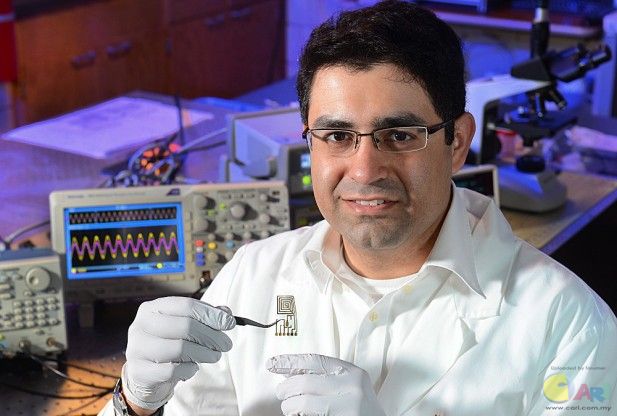 Imagine machines that melt away when their job is done. Perhaps a medical device that could melt away without harm inside the body, or a covert military device that delivers its data then dissolves without a trace. A researcher from Iowa State University says that this is a new way to look at electronics. “You don’t expect your cell phone to dissolve someday, right?” said Reza Montazami, an Iowa State University assistant professor of mechanical engineering. “The resistors, capacitors and electronics, you don’t expect everything to dissolve in such a manner that there’s no trace of it.” It might just be possible, Montazami thinks, and he is developing materials he calls “transient materials” or “transient electronics” to do just that. The findings of the study were published in a recent issue of Advanced Functional Materials and presented at a recent meeting of the American Chemical Society (ACS). These new materials are composed of special polymers designed to completely melt away when a trigger is activated. Despite the fact that it is a very new and relatively unexamined field of study, Montazami is sure that his team is making progress. So far, they are working on developing degradable polymer composite materials that will be suitable platforms for electronics, as well as having already built and tested an antenna capable of transmitting data and then degrading. Montazami’s team — including researchers from Iowa State, the US Department of Energy’s Ames Laboratory, and Washington State University — has focused recent research on the precise control of the degradation rate of polymer composite materials developed for transient electronics. “Investigation of electronic devices based on transient materials (transient electronics) is a new and rarely addressed technology with paramount potentials in both medical and military applications,” the team explained in a recent statement. At the ACS conference, Montazami demonstrated that potential by showing a video of an experiment. A blue light-emitting diode was shown, mounted on a clear polymer composite base. The electrical wires for the diode were embedded in the polymer. One drop of water started the melting process for both the polymer and the wires. After a small amount of time, the light was extinguished, and a second drop of water finished what was left of the base and wires.
To date, the team has developed transient resistors and capacitors, which have tested well. The current focus is on developing transient LED and transistor technology. As the technology continues to develop, the potential for commercial and military applications will grow. “Just think,” Montazami said,” if you lose your credit card, you could send out a signal that causes the card to self-destruct. Or, sensors programmed to degrade over certain times and temperatures could be stored with food. When the sensors degrade and stop sending a signal, that food is no longer fresh. Or, when soldiers are wounded, their electronic devices could be remotely triggered to melt away, securing sensitive military information.” Redorbit |
ADVERTISEMENT